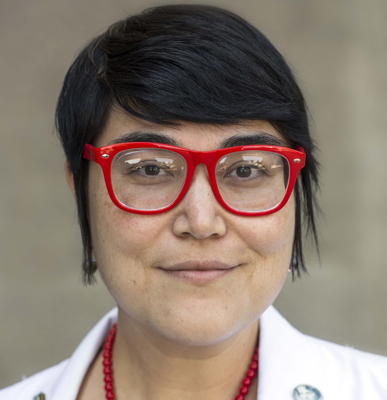Fumiko Chino, MD
Understanding the Effects of Financial Toxicity on Head and Neck Cancer Patients

Fumiko Chino, MD, and Yvonne Mowery, MD, PhD, led a prospective study of the impact of high treatment costs for head and neck cancer patients receiving radiation therapy (RT). This study was the first to collect actual out-of-pocket cost data for patients receiving radiation.
Patient costs are often overlooked and may be associated with increased symptom burden, poor treatment compliance and increased mortality. Patients being treated with RT for head and neck cancer are especially at risk for high out-of-pocket costs as well as significant side effects that often require new medications, nutritional supplements and potentially hospitalization due to dehydration or feeding tube placement. These patients often cannot work during the six to seven weeks of treatment and either need to travel long distances daily or stay near a major medical center during this time. Through their research, Drs. Chino and Mowery have shed important light on the effects of financial toxicity—a term for the hardship that patients face from their medical expenses—for head and neck cancer patients.
In the study:
- Participants collected all treatment-related bills in a binder, which also included educational materials focused on managing treatment-related toxicity, including financial toxicity.
- Patients completed surveys at baseline and three and six months after completing radiation therapy. The surveys assessed socioeconomic household information, treatment costs, quality of life, financial toxicity, self-reported quality of care and utility of the educational materials provided.
- The team analyzed the data to understand patients’ out-of-pocket expenses, their coping mechanisms, their satisfaction with the care they received, their quality of life and their attitudes toward communications with their health care team about treatment costs and cost-related treatment decision making.
Their results show that patients receiving RT for head and neck cancer experienced financial toxicity as they began treatment. Financial toxicity gradually improved after RT ended, although some patients continued to experience hardship six months post-treatment. Older, non-white, female and low-income patients had the greatest risk of financial toxicity. Patients reported that they decreased spending on basics or leisure activities, used savings, borrowed money, skipped medication doses or did not fill prescriptions to cope with the costs of their cancer care.
Dr. Chino’s passion to conduct research on financial toxicity stems from personal experience when she and her late husband went into massive debt to pay for his cancer treatment. Originally working in entertainment, Dr. Chino enrolled in medical school to pursue a new career in which she could bring attention to this issue and try to improve communication between patients and providers regarding treatment costs. Her ground-breaking research on financial toxicity has been covered by Forbes, National Public Radio (NPR), US News and World Report and JAMA Oncology.
Presentations
- Patient-Reported Outcomes and Financial Toxicity in Head and Neck Cancer (PaRTNer): Longitudinal Assessment of Financial Toxicity and Coping Mechanisms was presented at the 2024 Multidisciplinary Head and Neck Cancers Symposium.
- Environmental Toxicity of Driving Distance to External Beam Radiotherapy (EBRT) for Head and Neck Cancer Patients was presented at the 2023 ASTRO Annual Meeting.
- Patient-reported Outcomes and Financial Toxicity in Head and Neck Cancer (PaRTNer): Longitudinal Assessment of Financial Toxicity and Associated Quality of Life from a Pilot Study was presented at the 2023 ASCO Quality Care Symposium.
- Patient Reported Outcomes and Financial Toxicity in Head and Neck Cancer (PaRTNer): Longitudinal Assessment of Financial Toxicity and an Educational Intervention from a Pilot Study was presented at the 2022 ASTRO Annual Meeting.
- Patient Reported Outcomes and financial Toxicity in Head and Neck Cancer (PaRTNer): Baseline financial toxicity and attitudes toward costs from a pilot study was presented at the 2021 ASCO Quality Care Symposium.














